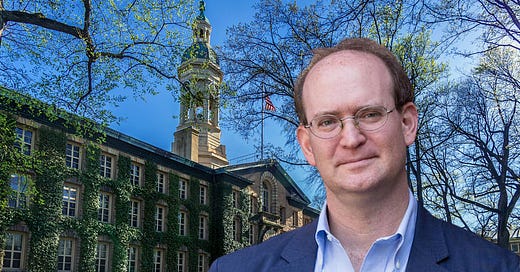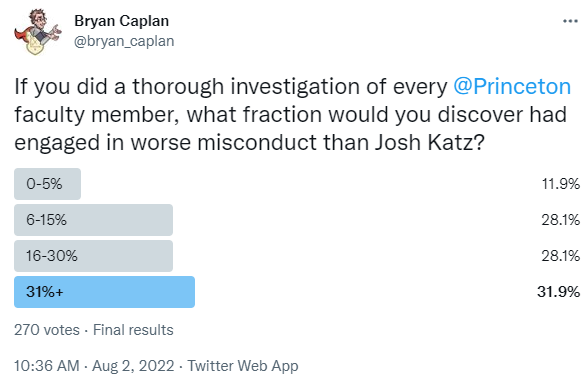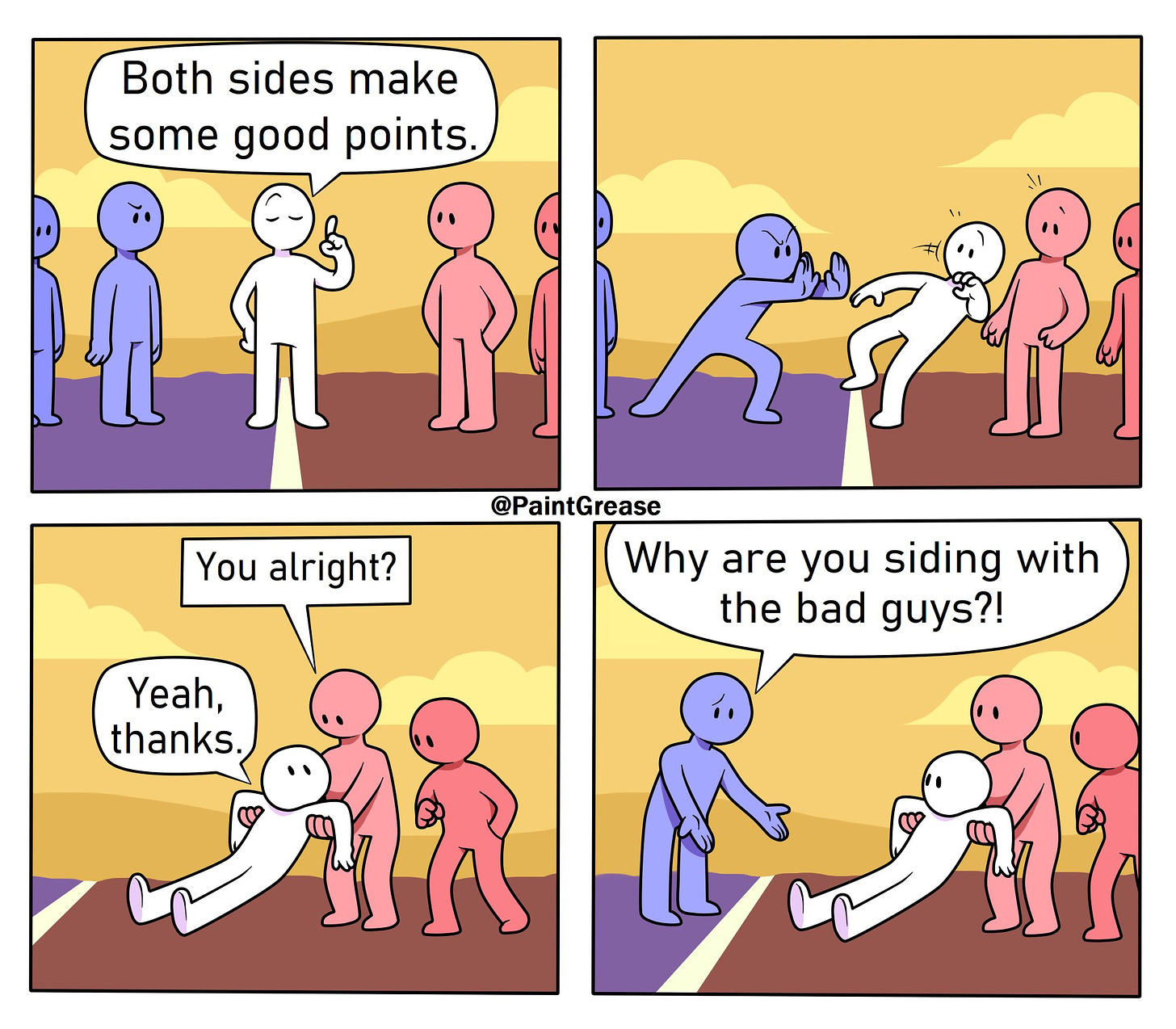
At this summer’s John Locke Institute’s Princeton Summer School, my colleagues included two involuntary celebrities: Joshua Katz and his wife, Solveig Gold. Princeton infamously revoked Katz’s tenure a few months ago. The sequence of key events:
15 years ago, Katz had an affair with one of his students.
In 2018, Princeton found out. After an investigation, he was suspended for a year without pay. As usual, both sides kept the investigation and punishment secret.
After the 2020 George Floyd protests and riots, some Princeton professors wrote a list of demands for combatting “systemic racism” at Princeton.
Katz wrote a critical response to these demands, entitled “A Declaration of Independence by a Princeton Professor.”
Many people at Princeton, including President Eisgruber, got angry at Katz’s response. But Eisgruber initially affirmed Katz’s academic freedom.
Someone leaked key info about the secret 2018 investigation. Which led to a second investigation.
Princeton claimed to find new details that put the affair in a far worse light, justifying the revocation of Katz’s tenure.
Katz was fired.
Solveig publicly stood by her man.
John Locke Institute head Martin Cox interviewed the duo in front of the summer school students; then they took questions.
Part of my John Locke schedule was talking to the students in small groups. The day after the Katz-Gold interview, all six groups were burning to discuss the issue. One main reaction, strangely, was: “What was the point of hearing that?” I was tempted to just self-referentially reply, “The very fact that you’re so eager to talk about it shows it was worthwhile,” but I held off in favor of a fun and frank discussion.
Here are my thoughts on the interview and subsequent conversations.
The students generally disliked Katz, and thought he failed to take responsibility for his misbehavior. When pressed, Katz did accept that his initial punishment was fair, but he focused on the unfairness of the second punishment.
Still, as far as I recall, zero students believed Princeton’s claim that Katz’s firing was not caused by his “Declaration of Independence.” Needless to say, I don’t believe Princeton either.
I asked students, “If you thoroughly investigated every Princeton professor, what share would look as bad or worse than Katz?” The median answer was around 20%. My Twitter agrees:
Abraham Lincoln didn’t actually say, “The best way to get a bad law repealed is to enforce it strictly.” While I’ve never been of a fan of Lincoln’s claim, I do wonder if an across-the-board investigation of the entire faculty would bring Princeton back to sanity.
I was surprised that neither Katz nor Gold related their predicament to the classics. What would Plato, Aristotle, or Cicero have thought about all of this, and would they have been right?
In the Q&A, I gave Katz the following hypothetical:
Princeton’s Board of Trustees comes to you and says, “You were completely right and we were completely wrong. We want to fix Princeton. Tell us exactly what to do, and we’ll do exactly as you say.” What do you tell them?
Getting Katz to respond was quite difficult. I tried leading the witness, asking, “Well, would you start by firing current Princeton President Eisgruber?,” but he was reluctant to assent. After much prodding, Katz agreed that Eisgruber should be demoted back to being an ordinary professor.
The strange thing about the Katz-Gold interview, to my mind, was the narrowness of their complaints. They mostly focused on the specific unfair treatment that Katz endured, not the general evils of the Orwellian uniformity and exclusion movement. If Princeton’s Board of Trustees told me, “Tell us exactly what to do, and we’ll do exactly as you say,” I’d start with mass firings of the administration, the elimination of all DEI employees, the elimination of all the grievance studies departments, and the end of not only affirmative action, but holistic admissions itself. Admission by standardized test scores alone isn’t a perfect system, but it’s the best system we’ve got - though I would place much heavier weight on APs than SATs. There was no sign that Katz or Gold would be on board with any of that.
Katz and Gold said that almost all of their Princeton friends continue to ostracize them. These “friends” didn’t just publicly distance themselves; they won’t even talk to them anymore. This did not, however, lead Katz or Gold to criticize academic elites as morally deficient people you should avoid.
Katz and Gold did mention that Princeton’s sexual harassment policies have become ridiculously expansive. According to them, a physics professor is officially forbidden to date a secretary in the politics department. It’s hard to find this rule in Princeton’s posted sexual misconduct policies, so perhaps this is just an unwritten policy.
Katz longed for the good old days when being a professor was fun and exciting, and the administration’s role was to support professors rather than dominate them. Now, in his view, the whole system is “bureaucratized” and “corporatized.”
I agree that universities are “bureaucratized,” but “corporatized”? Other than the government itself, it is hard to think of any other large organization where profit-and-loss matter less than elite universities. The real problem is that they’re fabulously rich non-profits run by leftist fanatics (and intimidated pragmatists).
Overall, Katz’s criticism of the academic status quo was mild. While he thought that universities used to be better, he didn’t decry the fall of academic meritocracy. He didn’t attack affirmative action in admissions or hiring. He didn’t denounce the arbitrary puritanism of the modern workplace.
Unsurprisingly, he did not suggest that discrimination and sexual harassment laws put us on the slippery slope to the fall of meritocracy and the rise of arbitrary puritanism.
Many students were creeped out not just by Katz’s affair, but by his current marriage. While they’re ultra-tolerant of unconventional sexual orientations and gender identities, a twenty-year age gap grossed them out.
I had fun challenging these attitudes. When they gasped, “There’s a twenty-year age gap!” I replied, “Maybe some people like a twenty-year age gap.” When they earnestly observed, “There’s a power imbalance here,” I replied, “Maybe some people like a power imbalance.”
My favorite hypothetical, though, was: “What if it’s true love?” To my mind, this is one of the strongest objections we have to any rule of the form, “X and Y should never date.” One common reply was, “Well, they can just wait a few years.” I had to provocatively respond, “A few years? If it’s true love, it’s agony to wait a few hours!” I couldn’t tell if I’d stumped my students, or if they just thought I was crazy.
Overall, the rise of Katz as a hero of the anti-woke movement reveals a remarkable asymmetry. As far as I can tell, he’s a moderate leftist who was victimized by the far left. His plight has not inspired him to rethink his overall political philosophy. The right, however, seems happy to take what it can get. There’s a lot of sociological truth in this oft-shared comic strip:


















"As far as I can tell, he’s a moderate leftist who was victimized by the far left. His plight has not inspired him to rethink his overall political philosophy."
They are all basically useless.
In general, they don't know why things ended up this way, don't know how to fix it, wouldn't have the courage to fix it if they knew, and more or less are just hoping that something, they are not sure what, will allow them *personally* to go back to the way things were.
I think you need to regard this kind of liberal as hopeless. This is true even if they were say nominally Republican or whatever. If Woke gets defeated, these people won't contribute much to its defeat.
Maybe Dr. Katz can get hired at University of Austin or Ralston College, two places where his freedom of speech would certainly be honored.
Thank you, Bryan for exposing this corruption. Sadly, it is not surprising.
Add this the the list of points you make in The Case Against Education.